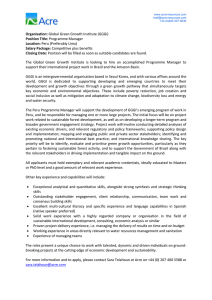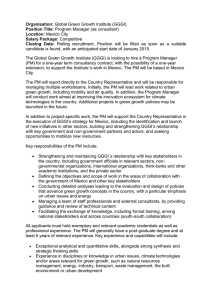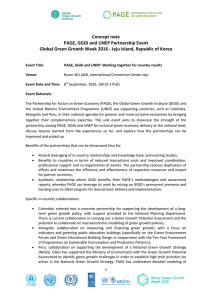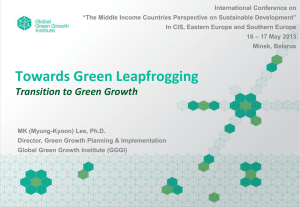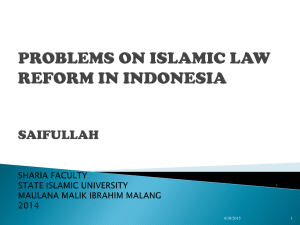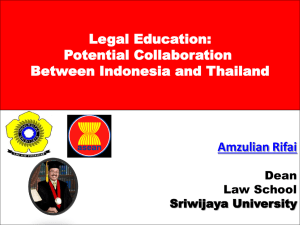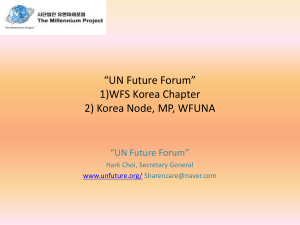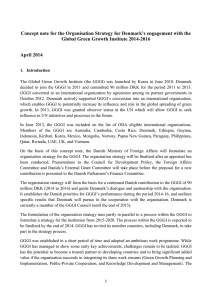Green Growth for Indonesia
advertisement
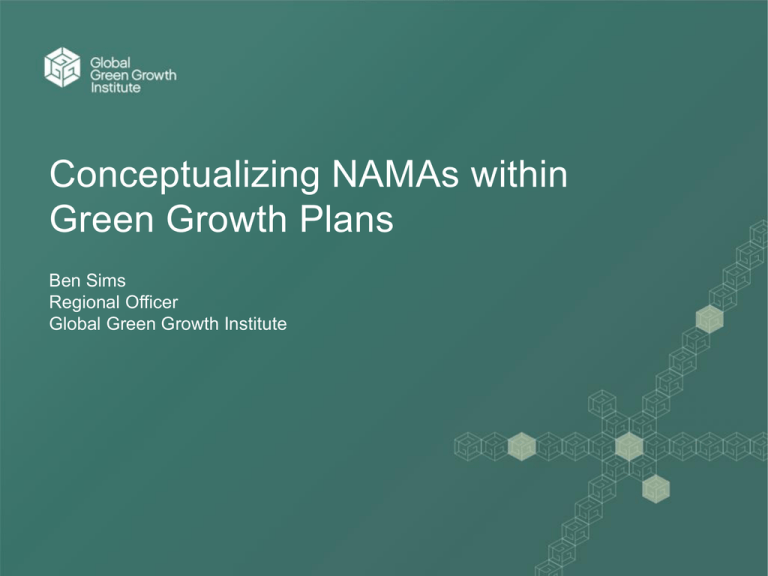
Conceptualizing NAMAs within Green Growth Plans Ben Sims Regional Officer Global Green Growth Institute CONTENTS 1. Introduction 2. Approach and mission 3. Workstreams 4. Snapshot of GGGI approach 5. Portfolio summary 6. GGGI’s focus in East Asia and the Pacific 7. Green growth planning and NAMAs 8. Future role of GGGI in NAMA programmes 9. Case study one: Indonesia 10. Case study two: Ethiopia INTRODUCTION Goals GGGI partners with countries to help them build economies that grow strongly, and are more efficient and sustainable in the use of natural resources, less carbon intensive, and more resilient to climate change. Member states and Operations APPROACH AND MISSION An equitable and sustainable growth trajectory that leapfrogs traditional modes of high-cost, resource-intensive growth Country Programmes Successful green growth outcomes Increased resilience to climate change and sustainable management of environmental resources Strategic investments and policy implementation for green growth Partner organization projects Green growth projects varying in scale and content that results in sustainable economic development Evidence High-cost, resource-intensive growth Growing evidence on the viability and advantage of green growth as a national strategy WORKSTREAMS GGGI Country Program Green Growth Planning & Implementation (GGP&I) Public-Private Cooperation (PPC) Partner Country Knowledge Development and Management (KDM) SNAPSHOT OF GGGI APPROACH 2 1 3 Green Growth Plan Development and Capacity Building Scoping Implementation 2 Analysis of country’s growth and development plans Sector by sector diagnostic and prioritization of opportunities Assessment of overall potential impact on the economy Financial analysis of costs and investment requirements Analysis and consultation on appropriate institutions, policies and capacity Development of investment plans PORTFOLIO SUMMARY Green Growth Planning Cambodia Jordan Mongolia China – Yunnan Province Kazakhstan Pacific Islands Mexico UAE Ethiopia Morocco Vietnam Agriculture Adaptation Energy Philippines Philippines Kazakhstan Mongolia East Africa South Africa Indonesia Forestry Brazil Columbia Peru Philippines Industry Urban Planning Transport Water Scoping Delivery Thailand Rwanda China Kazakhstan Mongolia Mekong Peru EAST ASIA AND THE PACIFIC Mekong Thailand Vietnam Cambodia Country Sector Cambodia Green Growth Planning Indonesia Green Growth Planning Pacific Islands Green Growth Planning Philippines Green Growth Planning; Adaptation Thailand Mitigation Vietnam Green Growth Planning Philippines Indonesi a Pacific Islands FUTURE ROLE IN NAMA PROGRAMMES As the mandate of the Global Green Growth Institute (GGGI) is to achieve transformational green growth in the countries with which it partners, GGGI could assist to design and implement NAMAs. GGGI is at an early stage in terms of NAMA support and future assistance could include: 1. 2. 3. 4. 5. Technical capacity Mainstreaming low carbon growth opportunities Providing advice on institutional frameworks Investment opportunities Private sector participation CASE STUDY ONE: INDONESIA INDONESIA • • • • Green Growth Framework and Assessment Green technology transfer Project proposals (i.e. solar PV development in East Kalimantan) Indicator development (MRV) 1 “To promote Green Growth in Indonesia that recognises the value of natural capital, improves resilience, builds local economies and is inclusive and equitable” 2 3 Green growth mainstreamed in planning & investments REDD+ for green growth Regional engagement 1A 1B Green Growth Assessment of Capital Projects across a variety of sectors 1C Development of innovative mechanisms to drive investment towards green growth sectors 2 To ensure that REDD+ finance, programs and policies catalyze green growth 3C K Green growth implementation in Central Kalimantan Province 3E K Green growth implementation in East Kalimantan Province Institutional Capacity Building Green Growth for Indonesia Development of a Green Growth Roadmap with tools and methodolologies to support policy and planning processes CASE STUDY TWO: ETHIOPIA ETHIOPIA • • • • • Ethiopia’s Climate Resilient Green Economy (CRGE) Initiative Sectoral Reduction Mechanism (SRM) Pipeline for delivering projects resulting in GHG reductions Finance for fast-track investments Methodology for reporting results (MRV) Thank you. ben.sims@gggi.org +82 10 9530 9920 www.gggi.org
